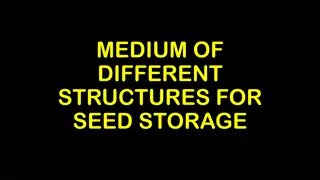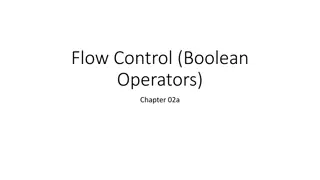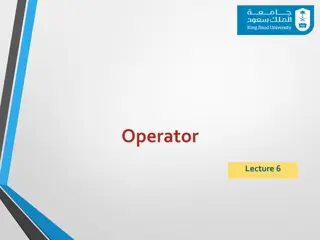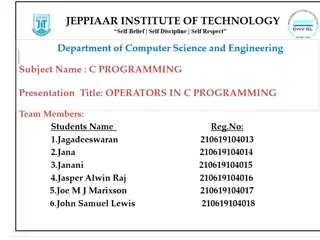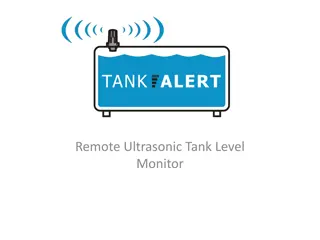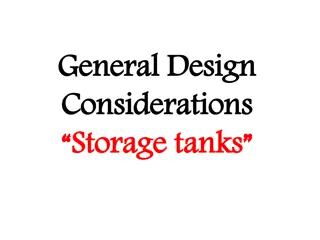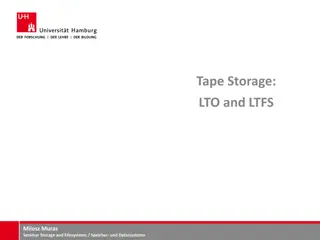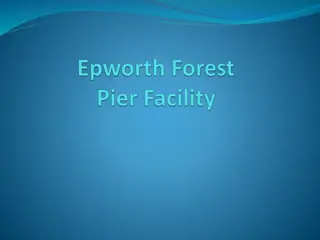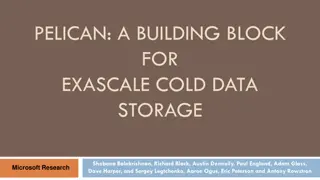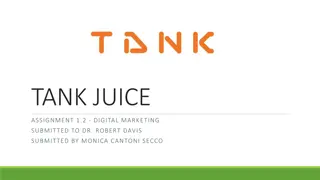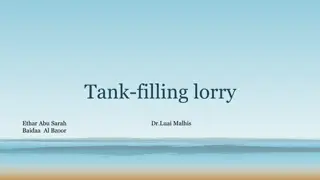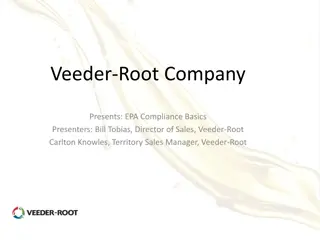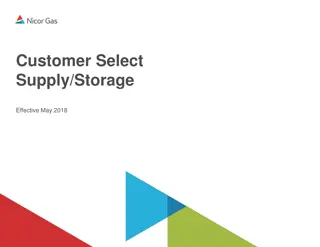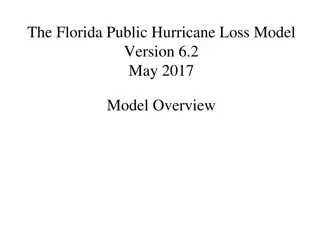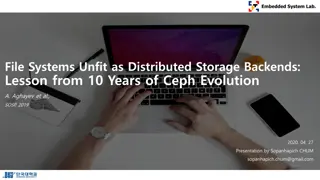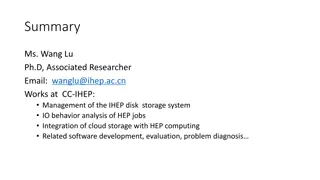Guide to Storage Tank Financial Responsibility for Owners and Operators in Florida
Understanding the financial responsibility requirements for regulated aboveground and underground storage tanks in Florida is essential for tank owners and operators. This guide provides information on different mechanisms to comply with financial responsibility regulations, including private insurance, financial tests, surety bonds, and other options. It also outlines the types of insurance coverage needed, liability coverage amounts, and compliance details for AST and UST owners. Visit the provided link for more in-depth information.
Uploaded on Sep 16, 2024 | 0 Views
Download Presentation

Please find below an Image/Link to download the presentation.
The content on the website is provided AS IS for your information and personal use only. It may not be sold, licensed, or shared on other websites without obtaining consent from the author. Download presentation by click this link. If you encounter any issues during the download, it is possible that the publisher has removed the file from their server.
E N D
Presentation Transcript
Financial Assurance Working Group Private Tank Insurance Guide for AST and UST Owners and Operators in Florida 10/6/2021 https://FloridaDEP.gov/waste/permitting-compliance-assistance/ content/storage-tank-financial-responsibility
Storage Tank Financial Responsibility Where Do I start? Regulated underground storage tanks (USTs) Chapter 62-761, F.A.C. Regulated aboveground storage tanks (ASTs) Chapter 62-762, F.A.C. The owner or operator of a regulated petroleum storage tank must show they have the financial resources to remediate a site if a discharge from a tank occurs and to pay compensation to third parties for personal injury or damage to their property. Financial Assurance Working Group 9/16/2024 2
Types of Financial Responsibility (FR) Documentation Florida Storage Tank Regulations allow you to choose from a variety of mechanisms to comply with the financial responsibility (FR) requirements. Private Insurance Financial Test (Self Insurance) Surety Bond The most frequently chosen mechanism is private storage tank insurance. This presentation is specifically designed as a guide to provide some basic information that will help in the selection and evaluation of private storage tank insurance. How to comply with FR Local Gov't Options Letter of Credit Corporate Guarantee Trust Fund For additional information regarding insurance and other financial mechanisms, visit our Storage Tank Financial Responsibility website Financial Assurance Working Group 9/16/2024 3
Insurance Policy Coverage Each policy or combination of policies must provide coverage for corrective action and paying for property damage and bodily injury caused by sudden and nonsudden discharges (together called accidental discharges ). The tables below show the required amounts of FR for AST and UST owners and operators. If both types of tanks are included, cover the larger per occurrence and larger annual aggregate amounts. Financial Assurance Working Group 9/16/2024 4
Liability Coverage Amounts Aboveground Storage Tanks (ASTs) Underground Storage Tanks (USTs) Per Occurrence Coverage Annual Aggregate Coverage Owner Type Annual Aggregate Coverage Facility s Total Tank System Capacity in Gallons* Per Occurrence Coverage Group 1: Petroleum Marketers $1 million: 100 or fewer tanks $1 million >550 & 10,000 $500,000 $1 million OR $2 million: more than 100 tanks > 10,000 & 30,000 $1 million $1 million $500,000: throughput 10,000 g./mo. > 30,000 & 250,000 $1 million $2 million Group 2: Non-Marketers $1 million: 100 or fewer tanks > 250,000 $3 million $6 million OR OR Choose single facility with largest capacity $1 million: throughput > 10,000 g./mo. $2 million: more than 100 tanks - g./mo. = 12-month average gallons per month Financial Assurance Working Group 9/16/2024 5
Understanding Your Options You will be asked questions by your insurance agent or broker regarding your tank system that will allow you to make choices on what type of policy you want to purchase. Differences in policy terms, such as deductibles, will affect what premium you pay and most importantly what costs the Insurer will and will not pay. Items considered by Insurers include: Tank System Status and Components Tank type, age, material, product Piping material, age, distance Containment Compliance Records History of prior discharges Inspection records Tank system testing data Continuity of insurance coverage Financial Assurance Working Group 9/16/2024 6
Show to Inspectors Show inspectors a complete copy of your signed policy either an Insurance Endorsement or a Certificate of Insurance a Certification of Financial Responsibility). Insurance Endorsement or Certificate of Insurance DEP Form 62-761.900(3) Part C or Part D must be used (current version at time of signing) Coverage: Per Occurrence and Annual Aggregate amounts are adequate Coverage: corrective action and (not "or" or "and/or") accidental discharges Includes list of current Facilities and Tanks Insurer's representative is authorized to amend policies Financial Assurance Working Group 9/16/2024 7
Questions to Ask Your Broker Does the policy include voluntary tank removal and/or site investigation exclusions/ limitations, loading and unloading exclusions/ limitations and/or choice of law other than Florida? If YES, the policy likely does not meet Florida s FR requirements. Is the Insurer eligible to provide insurance in Florida? Is the signed Certificate of Insurance or Endorsement on the current version of DEP Form 62-761.900(3) Part C or Part D? Does the policy provide the proper amount of coverage as specified 40 CFR 280.93 (for USTs) and Paragraph 62-762.421(3)(d), F.A.C. (for ASTs)? Does the policy include a self-insured retention? If YES, then the policy may not meet Florida s FR requirements. Does the retroactive date (date when coverage begins) give adequate coverage? Any loss determined to have occurred before this date will not be covered by the policy. This is usually required when there is a gap between when the current policy begins and the previous policy expired. Does the policy include coverage for both sudden and non-sudden accidental discharges? Does the policy cover corrective action? Does the policy cover all the tanks at each facility? Are all covered facilities correctly identified in the list (schedule) of facilities and tanks? What are your reporting requirements? DEP and Insurers have notification timeframes. Financial Assurance Working Group 9/16/2024 8
Insurance Policy Details Read your policy carefully and discuss it with your insurance agent or broker to make sure you fully understand what you are purchasing and what your responsibilities are if your storage tank has a leak or discharge. Limits of Insurance: How incident limits apply (relative to the aggregate, the deductible, defense costs, etc.). Policy Conditions: Insured s duties in event of a claim, cancellation, other insurance, warranties. Extended Reporting Period: A minimum 6-month time period during which the Insured can report a discharge that occurred during the time the policy was in effect, but after the policy end date. Declarations Page: Coverage Summary (Insured Name, Address, Locations, Limits, Deductibles, Term, etc.) Insurance Documentation: Certificate of Insurance or Insurance Endorsement (if your tank s insurance coverage is an expansion of a policy you already have). Insuring Agreement: Coverages that are intended to be paid. Exclusions/Limitations: What is not covered. Describes specific circumstances in which no coverage will be provided. Schedule of Covered Storage Tanks Endorsement: List of facilities and tanks covered by the policy. Financial Assurance Working Group 9/16/2024 9
Final Page Disclaimer This presentation provides information to promote compliance but is not a substitute for the financial responsibility requirements detailed in Chapters 62-761 (USTs) and 62-762 (ASTs), F.A.C. Visit our website: https://floridadep.gov/waste/permitting-compliance-assistance/content/storage-tank-financial- responsibility Prepared by: Financial Assurance Working Group Permitting & Compliance Assistance Program Department of Environmental Protection (DEP) 2600 Blair Stone Road MS 4548 Tallahassee, Florida 32399-2400 Based on a brochure created by the Association of State and Territorial Solid Waste Management Officials End of presentation 9/16/2024 10



